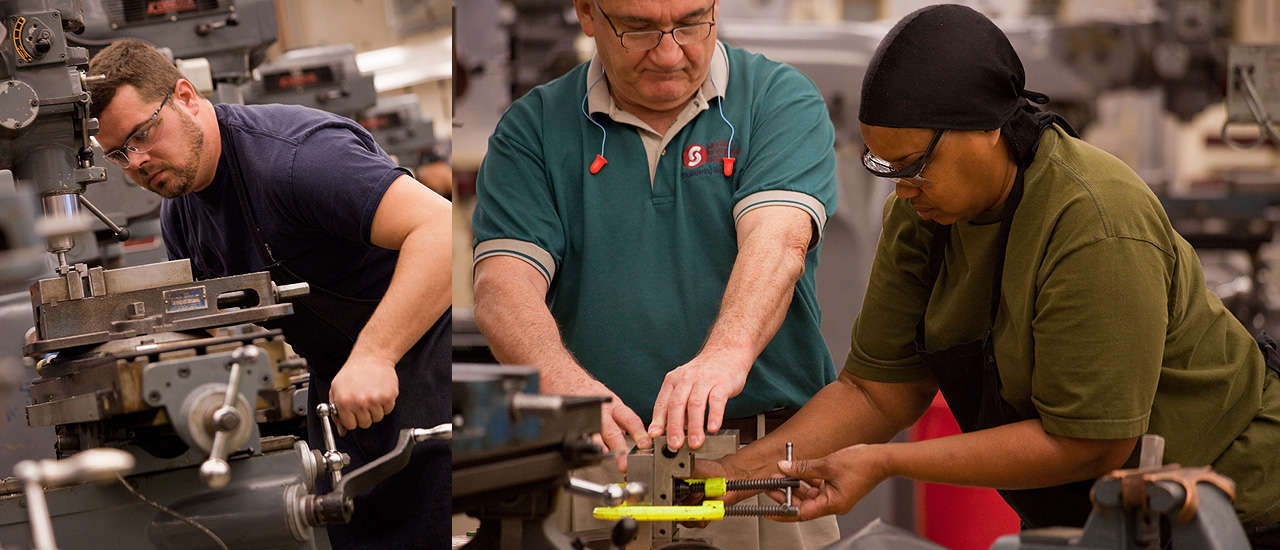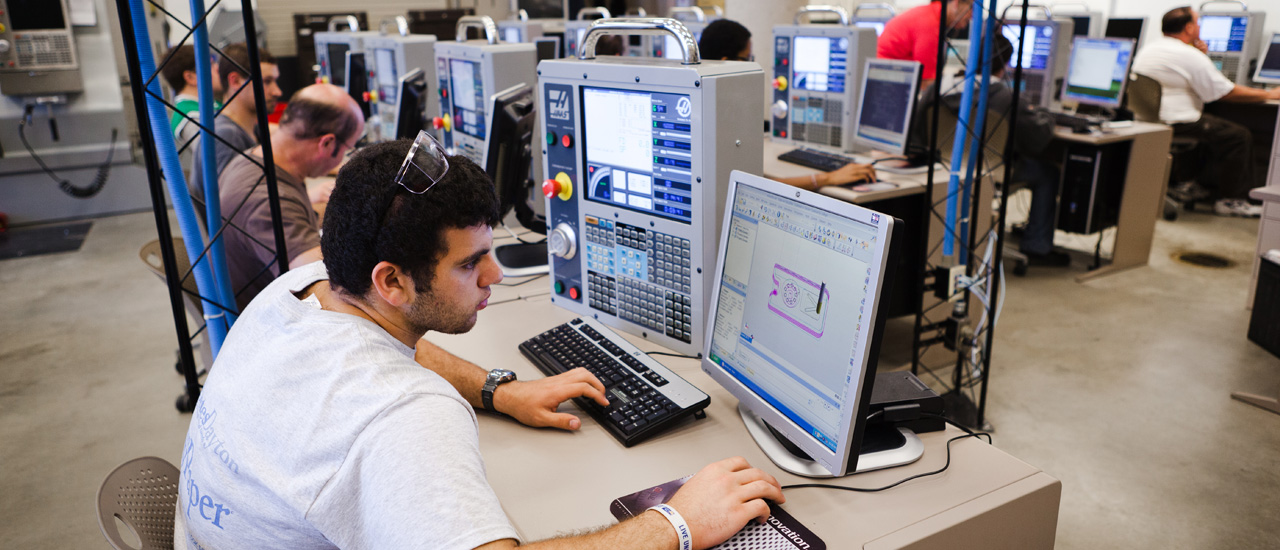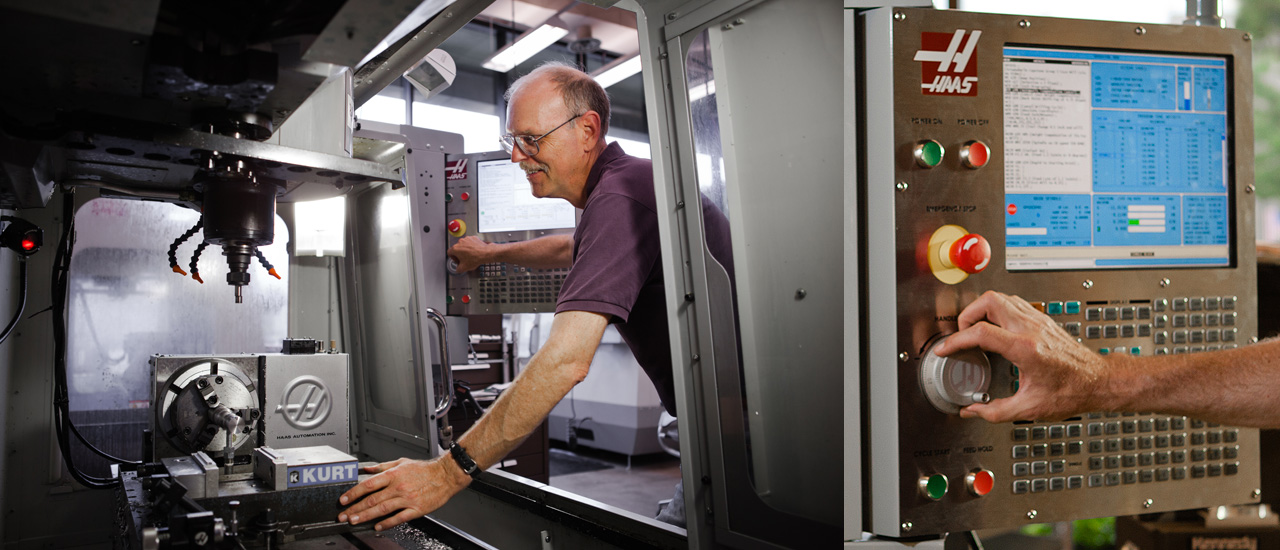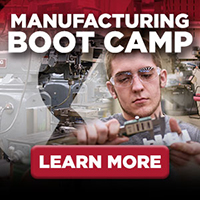Computer Aided Manufacturing
The world of manufacturing can no longer be thought of as a dingy, dark world of dull uninteresting jobs. Manufacturing today drives all other technologies and is bringing the trade skills of the past and joining them with the technology of today and the future. Careers in manufacturing are so broad and cover so many areas anyone seeking a career in manufacturing will be in a skills class that is growing by leaps and bounds providing a diverse world of opportunities and wage-earning growth. Anyone can become a part of this fast-growing field with Sinclair’s Computer Aided Manufacturing programs.
Students of the program may participate on a Work-based Learning (WBL) experience to gain internship college credit towards their degree or certificate of study. The WBL experience is managed by the Office of Work-based Learning and they assist students with professional development and help make meaningful connections between academic course work and a practical work experience. WBL opportunities allow students to directly apply skills learned in the classroom to future career opportunities. They are designed to provide an authentic learning experience for students to link academic, technical, and professional skills within a program of study for academic credit.

The Sinclair Machine Shop

Students Working in the HAAS LAB

Instructor Demonstrates Using the HAAS Machine
What are the objectives of the Computer Aided Manufacturing program at Sinclair?
The Computer-Aided Manufacturing programs provide the needed essential, current, and hands-on based technological skills necessary to thrive in today’s manufacturing world. The curriculum provides leading-edge technology in the focus areas of machining, tool design, jig and fixture design, CNC programming, and applications. This leads students to careers in manufacturing or a pathway to enrollment in a four-year manufacturing technology program. As a Haas Technical Education Center students will train on state-of-the-art Haas equipment and are eligible to compete for Haas Scholarship funding.
Sinclair will continue to work closely with the Dayton Region Manufacturers Association (DRMA) along with many small, medium, and large manufacturers to provide candidates and educational resources that will help to train and fill many current, and future manufacturing positions.
Laboratories and equipment used in this program rank among the best in the region.
Over four million dollars worth of state-of-the-art machining equipment includes Computer Numerical Control (CNC) machining centers, CNC lathes, manual lathes, manual milling machines, surface grinders, drill presses, a complete 16 booth welding lab, sheet metal lab, a ProtTRAK area for conversational programming with ProtoTRAK equipped mills (2 and 3 axis), along with a ProtoTRAK lathe, and an Omax portable Water-jet.
Lab tours are conducted by our technicians and are available by appointment.
Information:
 Available Programs
Available Programs
For program specific information click on the program below:
Graduates of the CAM CNC certificate programs are candidates for the completion of this two-year associate degree option. Coursework includes tool and manufacturing processes, computers in engineering technology, quality control, and CNC applications. Facilities and equipment rank among the best in the nation, with more than four million dollars in conventional machining equipment and computer numerical control machines for laboratory use by students. If you do not want to receive the embedded certificate(s), please notify Registration and Student Records at studentrecords@sinclair.edu.
View Full Program Details
Graduates of the CAM precision machining certificate programs are candidates for completion of this two-year associate degree option. More in-depth focus is given to enhancing communication and mathematical skills. A greater development of knowledge in industrial courses is also emphasized, including such areas as tool design, computer numerical control, jig and fixture design, process engineering and basic statistics. If you do not want to receive the embedded certificate(s), please notify Registration and Student Records at studentrecords@sinclair.edu.
View Full Program Details
This program provides any student whether working full time, raising a family, or going to college, the ability to pursue the exciting and in-demand career of precision machining. Recent events have shown that these careers are essential in nature and can offer employment when others do not. Starting from basic machining through advanced machining, close tolerance grinding, introduction into the world of CNC and Conversational programming, the production of detail parts ,and then their fit and assembly into a working product. This program will ready the student for a wide variety of manufacturing careers through the development of the skills and traits that manufacturers are looking for. This program can be started in any semester.
View Full Program Details
This certificate in tool making provides the student with the technical and hands-on experience required by employers in both an entry and apprenticeship level. This program will provide experience in safety, advanced manual machining, drafting and design, Computer Numerical Control (CNC) and conversational programming, welding and metal joining, measurement tools and techniques, and other instruction and experience needed within this trade. This program is available to anyone and works well with the apprenticeship model or those that need to work and learn at the same time.
View Full Program Details
Based on an Industry need this certificate meets specific needs in precision Welding, Metal Joining and Fabrication techniques that will align and work in conjunction with student and industry needs. This certificate will help students already working in industry and allow others to build skills that will help with entry level employment. This certificate program contains the Welding and Metal Joining (CAMWM.S.STC) embedded certificate which will be automatically awarded when the certificate requirements are completed. If you do not want to receive the embedded certificate, please notify Registration and Student Records at studentrecords@sinclair.edu.
View Full Program Details
This short term certificate (STC) is designed to enhance the machining skills of students who have taken machining courses in high school or to allow individuals with little or no experience in machining to quickly obtain a certificate which may in turn qualify them for an entry level position in a machining company. Course work is focused on introductory levels of manual machining and basic operation of CNC machines. This STC is the first half of the Computer Numerical Control Technology short term certificate and will provide students with a milestone of completion and the ability to continue their education up to and including a two year Associate of Applied Science degree in CNC operations.
View Full Program Details
This certificate is designed to provide basic precision machining skills to workers entering the field of manual machining. It is the first half of the Advanced Precision Machining Certificate and is provided for students who are wishing to enter the workforce with the minimum skill level required to become an effective machinist. All courses in this short-term certificate will lead to an AAS degree in Computer Aided Manufacturing Precision Machining. Course work focuses on basic machining skills necessary to operate manual lathes, mills, and grinders.
View Full Program Details
The Computer Numerical Control (CNC) Technology short-term certificate program is designed for individuals who are looking to upgrade their current manufacturing skills along with students who are interested in pursuing entry-level careers in the area of CNC machining. Coursework is focused primarily in the area of CNC lathe and mill operation, setup and programming. The courses included in this short-term certificate apply directly to the associate degree in Computer Aided Manufacturing, CNC Technology option.
View Full Program Details
This certificate in welding and metal joining contains in-depth hands-on labs which will include MIG, TIG, Stick (ARC), and Ox-acetylene use along with other types of metal joining options and instruction to include sheet metal layout, shearing, bending, riveting, brazing and spot welding. Welding safety, personal protection equipment, and special welding tools will be taught in-depth and used by the students within the lab setting. The other courses within the certificate offer an introduction to the manufacturing processes used in the tooling, machining, the welding industry, a focus on blueprint reading, design using AutoCAD, various measurement techniques and the mathematics necessary to solve applications in welding and manufacturing technology.
View Full Program Details
 Available Programs
Available Programs




